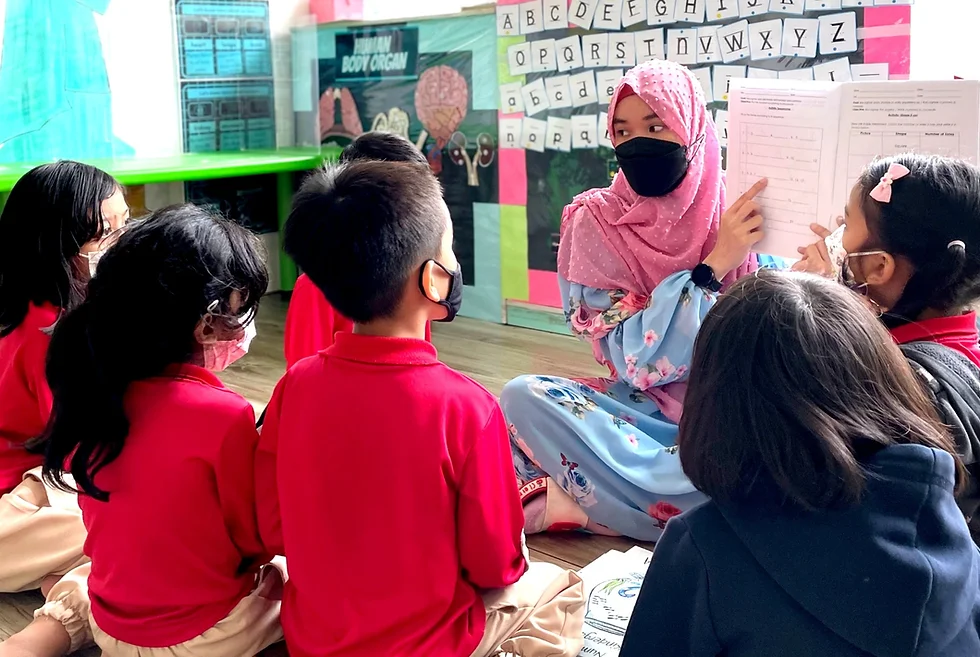Did you know that engaging in simple, daily conversations with your child plays a critical role in their speech development?
At Ilham Child Care, we believe that meaningful small talk can do wonders in helping children build vocabulary, express their thoughts, and gain confidence in speaking.
You don’t need complicated methods or tools—just being present, talking, and listening can create a positive impact. Let’s explore how everyday conversations can nurture your child’s speech and language skills!
Understanding Speech Development in Children
Speech and language development follows specific milestones as children grow:
- Infants (0–12 months): Begin by cooing, babbling, and responding to sounds.
- Toddlers (1–3 years): Start using simple words, combining them into short phrases, and understanding instructions.
- Preschoolers (3–5 years): Develop more complex sentences, ask questions, and engage in conversations.
Each child progresses at their own pace, but their environment plays a huge role. Parents and caregivers are their first teachers, and daily conversations are vital for developing these skills.
How Everyday Conversations Enhance Speech Development
Regular conversations with your child offer countless benefits for speech and language skills:
- Vocabulary Growth: Talking exposes children to new words and meanings. For example, describing your actions during cooking helps them learn terms like “stir,” “pour,” and “boil.”
- Sentence Formation: By hearing complete sentences, children learn proper grammar and sentence structure naturally.
- Confidence in Expression: Asking questions and encouraging your child to speak builds their confidence to express thoughts and feelings.
Conversations help children process information, think critically, and communicate effectively—skills that are crucial for their future success.
Practical Tips for Engaging in Meaningful Conversations with Your Child
You can make conversations fun and productive by trying these simple tips:
Be an Active Listener
Show interest in what your child says. Nod, smile, and respond thoughtfully to keep the conversation going. This encourages your child to talk more.Ask Open-Ended Questions
Questions that start with “how,” “why,” or “what” encourage your child to think and answer with longer responses. Examples:- “What was the most fun part of your day?”
- “How did you feel when you solved that puzzle?”
Narrate Daily Activities
Talk about what you’re doing during routines like cooking, cleaning, or driving. Example: “I’m folding your red shirt now. Next, I’ll hang it up to dry.”Read and Discuss Stories
Reading books together introduces new vocabulary and concepts. Pause to ask, “What do you think happens next?” or “Why is the character sad?”Use Positive Reinforcement
Praise your child for their effort, even if they make mistakes. Example: “I love how you tried to say that word!”
Creating a Language-Rich Environment at Home
A language-rich home helps children develop speech skills naturally. Here’s how you can create it:
- Talk Frequently: Engage in regular conversations, even about simple things like what you see during a walk.
- Sing Songs and Rhymes: Music and rhymes help children learn patterns of speech and pronunciation.
- Encourage Storytelling: Let your child tell stories about their toys, experiences, or dreams.
The more you talk and engage with your child, the more confident they become in expressing themselves.
Overcoming Challenges in Speech Development
Some children may be shy or take longer to speak clearly. Here’s what you can do:
- Be Patient and Supportive: Avoid pressuring them to speak perfectly. Give them time and encouragement.
- Make Conversations Fun: Use games, songs, or playful activities to motivate them.
- Seek Help if Needed: If you notice consistent delays or difficulties, consult a speech therapist for guidance.
Every child’s journey is unique, and small, consistent efforts make a big difference.
5 Open-Ended Questions to Encourage Critical Thinking
Here are five questions you can use to promote deeper conversations with your child:
- “What was the most interesting thing you did today?”
- “How did you feel when you solved that problem?”
- “What are you excited to learn about tomorrow?”
- “If you could change one thing about today, what would it be?”
- “What’s something new you discovered this week?”
These questions encourage reflection, expand their thinking, and help improve speech fluency.
FAQs
1. How can I tell if my child’s speech development is on track?
Compare their progress with general milestones for their age. If unsure, consult a professional.
2. What should I do if my child is not speaking as much as peers?
Encourage daily conversations, use open-ended questions, and seek expert advice if concerns persist.
3. Are there specific activities to boost my child’s speech development?
Yes! Activities like reading together, singing songs, and narrating routines are great for speech growth.
Small, everyday conversations
hold the power to transform your child’s speech development. By talking, listening, and engaging with your little one, you’re not only expanding their vocabulary but also building their confidence and communication skills.
At Ilham Child Care, we encourage parents to embrace these daily moments and make conversations meaningful and fun. After all, it’s in these simple exchanges that children grow into confident speakers and thinkers.
Let’s make small talk a big part of our children’s lives! 💬✨

 Take the First Step
Take the First Step
